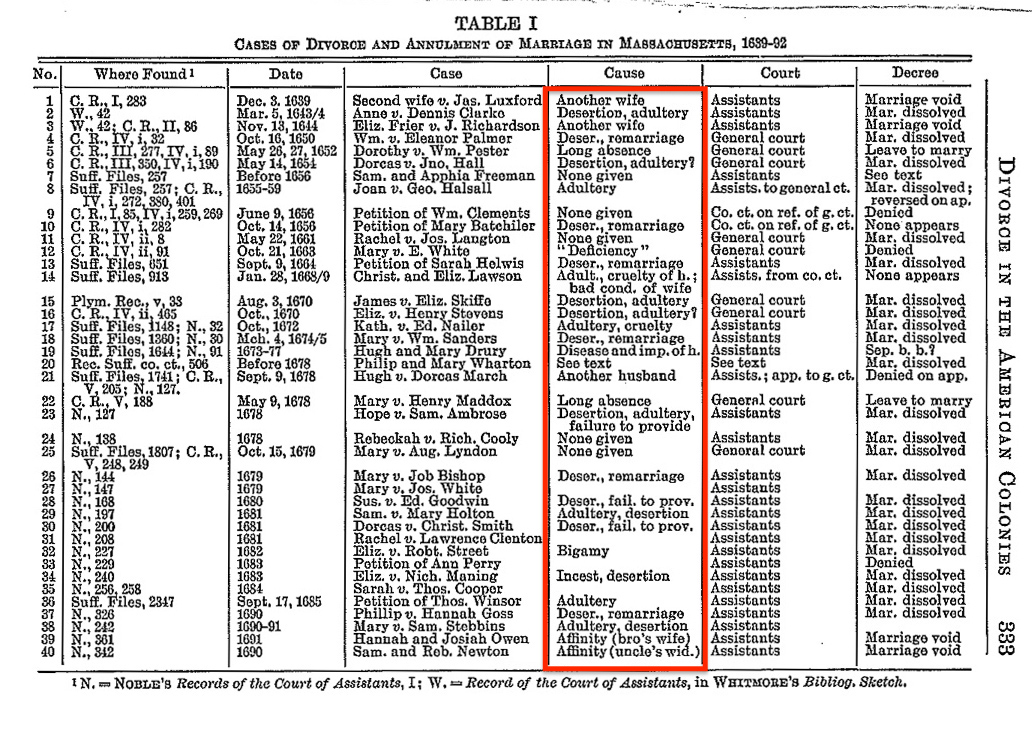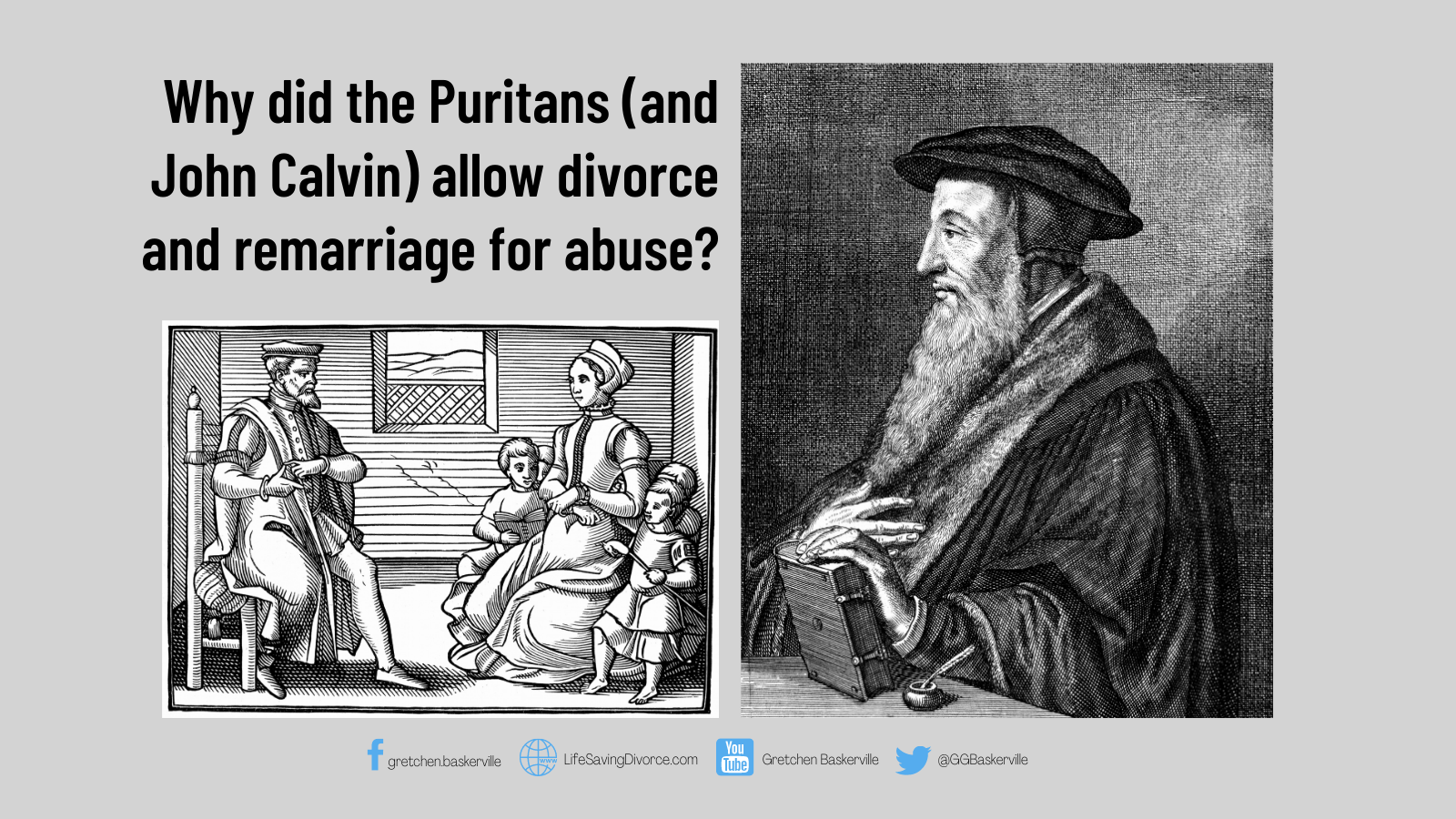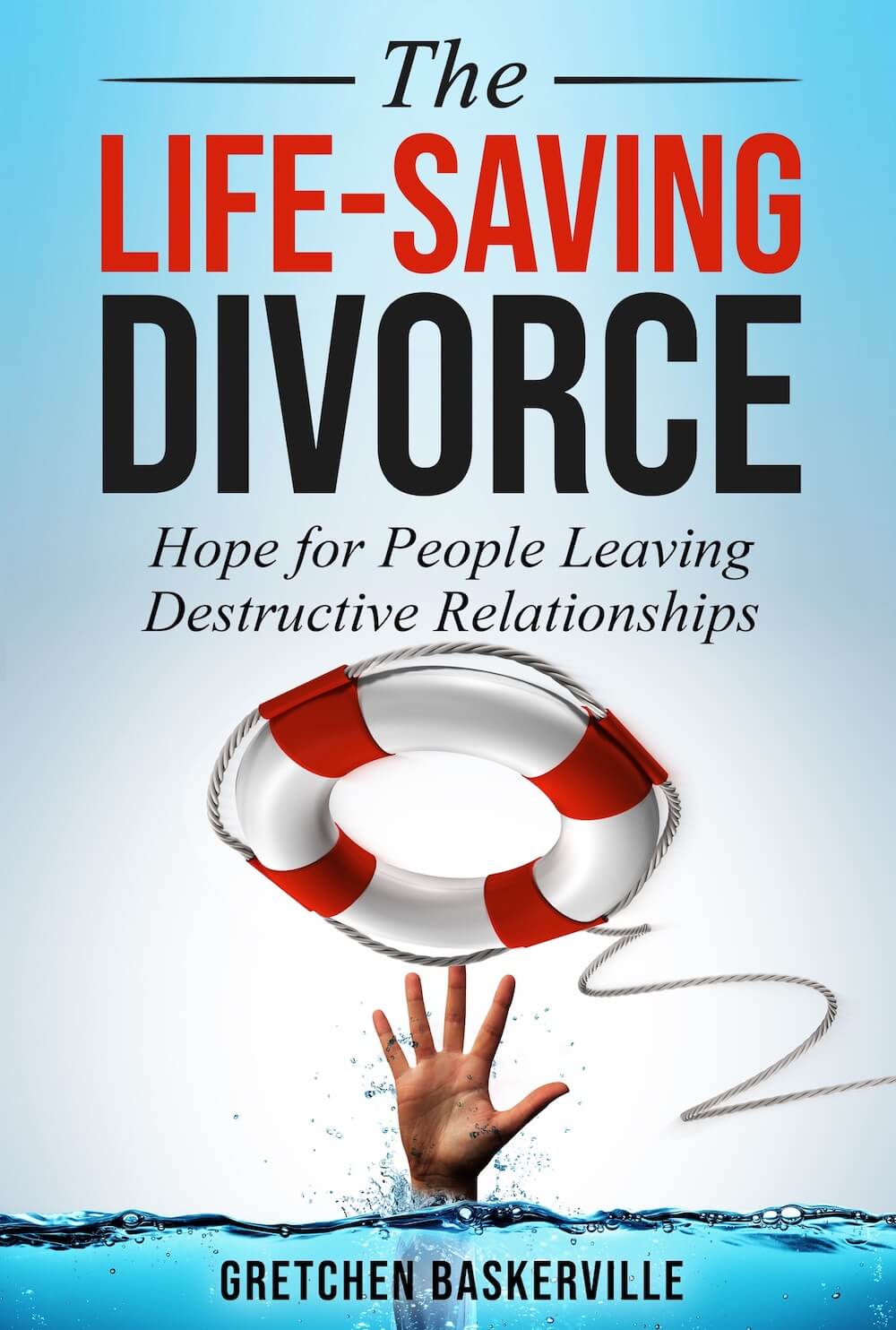What Was the Puritan View of Divorce?
Were There Any Puritan Divorces?
Although the Puritans wanted to create a godly society in America, they were realistic about abuse, desertion, and betrayal. They were followers of Protestant Reformer John Calvin (and his Geneva Bible translation), who viewed marriage as a civil matter, not a religious matter. Calvin wanted to end clergy celibacy and monasticism practiced by Roman Catholicism. The Puritans carried the Geneva Bible to the New World, and they had multiple acceptable grounds for divorce. (See list at the bottom of this blog post.)
Inspired by John Calvin and other reformers, the authorities in Geneva…
“…introduced absolute divorce on grounds of adultery and malicious desertion, and allowed innocent husbands and wives alike to sue for divorce, custody, and alimony. They encouraged the remarriage of divorcées and widow(er)s.” -John Witte, Jr., “John Calvin on Marriage and Family Life,” In book: The Calvin Handbook, 2008, William B. Eerdmans Publishing Co
Calvin wanted to protect abused wives.
“[The authorities in Geneva] created new protections and provisions for abused wives, impoverished widows, and ravished maidens. Many of these reforms introduced by Calvin and his colleagues in sixteenth-century Geneva were echoed and elaborated in numerous Protestant communities, eventually on both sides of the Atlantic. A good number of these reforms found their way into modern civil law and common law traditions as well.” -Ibid. p. 3
Calvin’s desire to protect abused wives was based on his interpretation of the verse Malachi 2:16 (Geneva Bible), which was consistent with earlier Bible versions:
“If thou hatest her, [a]put her away, saith the Lord God of Israel, yet he covereth [b]the injury under his garment, saith the Lord of hosts: therefore keep yourselves in your spirit, and transgress not.”
Prior to the King James Version, which was published 40 years after Calvin’s death, Malachi 2:16 had never been interpreted as “God hates divorce.” From 500 BC to AD 1600, it had been interpreted as a rebuke of hypocritical men who “hated” and divorced their wives unjustly, without adequate cause. (See chart of major Bible translations from 500 BC to today: Malachi 2:16.)
Calvin also condoned remarriage for both the innocent and guilty spouses:
“[Calvin] insisted that the guilty party continue to pay alimony and child support as an ongoing sanction even if the remarried spouse and children were now cared for. Calvin insisted further that the guilty party should eventually be allowed to remarry, too. “[I]t would be harsh to prohibit a man from marrying during his whole lifetime if his wife has divorced him for adultery, or to prohibit a woman who has been repudiated by her husband, especially if they have difficulty with being sexually continent; one indulgence necessarily brings the other along with it.“ – Ibid. p. 12
Table: This chart shows every known divorce among the Massachusetts Puritans 1639-1692. There are 40 divorces listed and the columns give the record location and page, the date, the names of the individuals, the cause of the divorce, the court (the jurisdiction), and the decree (the final judgment)

Did the Puritans Divorce, or Did They Have a Utopian Society?
The first known divorce in America was on December 3, 1639, when Elizabeth Luxford discovered her husband James Luxford already had another wife and went to the court for justice. The magistrates were not pleased with James. They granted Elizabeth the divorce, took James’s property, gave it to Elizabeth, and- “Next, the court turned its wrath on the deceitful Luxford. Not content with levying a fine of £100 on the bigamist, it sentenced him to ‘be set in the stocks an hour upon the market day after the lecture,’ and to be banished to England ‘by the first opportunity.'”
There weren’t a lot of divorces in Puritan society, but we do have records of 40 of them.
Notice the causes the Puritans listed for the divorce:
-
Another wife
-
desertion
-
adultery
-
remarriage
-
long absence
-
deficiency
-
cruelty
-
bad condition of wife
-
cruelty of husband
-
disease and impotence of husband
-
desertion, failure to provide
-
bigamy
-
incest
-
affinity (meaning consanguinity, too closely related)
The Puritans rejected the Roman Catholic and Anglican view of marriage as a sacrament and therefore unbreakable. They considered Roman Catholic views to be a “popish invention, with no basis in the Gospels.” They saw marriage as a civil matter, not a religious one. According to the New England Historical Society, “In 1620, [Plymouth Plantation] leaders decided marriage belonged to the courts, not to the church. Therefore, they concluded, the courts could grant a Puritan divorce.” They often granted alimony to the wife if she was the innocent party.
John Calvin’s Influence on the Puritan View of Marriage
The famous Reformer John Calvin (1509-1564) was angry at men who abused their wives. He thought those cruel husbands should divorce and let their tyrannized wives go free.
Here’s how John Calvin translated Malachi 2:16 in his Geneva Bible
If thou hatest her, [a]put her away, saith the Lord God of Israel, yet he covereth [b]the injury under his garment, saith the Lord of hosts: therefore keep yourselves in your spirit, and transgress not.
So Calvin interprets it to say “If you hate your wife, divorce her,” says the Lord God of Israel…”
His commentary on Malachi 2, gives this interpretation to Malachi 2:16 (the so-called God-Hates-Divorce verse).
Here John Calvin is talking directly to abusive husbands who try to hide their bullying behavior from God and others.
“What else is this,” he says, “but to cover by a cloak your violence, or at least to excuse it? for ye do not openly manifest it: but God is not deceived, nor can his eye be dazzled by such a disguise: though then your iniquity is covered by a cloak, it is not yet hid from God; nay, it is thus doubled, because ye exercise your cruelty at home; for it would be better for robbers to remain in the wood and there to kill strangers, than to entice guests to their houses and to kill them there and to plunder them under the pretext of hospitality. This is the way in which you act; for ye destroy the bond of marriage, and ye afterwards deceive your miserable wives, and yet ye force them by your tyranny to continue at your houses, and thus ye torment your miserable wives, who might have enjoyed their freedom, if divorce had been granted them.”
Treachery Behind Closed Doors: When A Person Ought to Feel Safe
Notice how Calvin says it’s one thing for a robber to kill a traveler in a forest out in the open, where that person knows there is danger. But it’s especially treacherous for a robber to offer hospitality and invite a guest into their home and then kill and pillage them. And yet this is what cruel men do to their wives. They pretend to honor the marriage bond, but instead they torment their wife under her own roof, secretly, hidden under a cloak, in the one place that ought to be safe. John Calvin says, God sees it, and he isn’t dazzled by clever concealment. In fact, the concealment makes it twice as bad. It would be better to let the tormented wife go and enjoy her freedom.
Link to two Reformed pastors discussing this quote, and why they believe abuse victims have valid grounds for divorce AND links to other pastors and Calvinist pastors/theologians today who believe that abuse is grounds for divorce.
Footnotes
Table: This table of every known Massachusetts Puritan divorce was published in the book, A History of Matrimonial Institutions, Vol 2, by George Elliot Howard, 1904. University of Chicago, p. 333.
Puritan view of marriage: “The Puritan Divorce Allows Escape From the Chain of Matrimony,” New England Historical Society (2019), accessed 8/17/19, http://www.newenglandhistoricalsociety.com/puritan-divorceallows-escape-from-the-chain-of-matrimony/.
Luxford divorce: Glenda Riley, Divorce: An American Tradition (Oxford: Oxford Press, 1991), 12. Male adultery wasn’t accepted as grounds for divorce in Massachusetts until the late 1700s. In a farming society, female adultery was considered much worse because a child could claim the right to inherit the land. Regarding impotence, in virtually all ancient agrarian societies, even in Jewish society prior to Christ, the inability to bear children was viewed as a serious problem. Men were responsible for having at least two children.
Are you going through a life-saving divorce and need support and clarity? I’d like to invite you to my private Facebook group, “Life-Saving Divorce for Separated or Divorced Christians.” Just click the link and ANSWER the 4 QUESTIONS. This is a group for women and men of faith who have walked this path, or are considering it. Supporters and people helpers are also welcome. I’ve written a book on divorce for Christians and other people of faith, The Life-Saving Divorce: Paperback: https://amzn.to/3cF1j25 Or eBook: https://amzn.to/3CCBsnr
Also, sign up for my email list below or HERE www.lifesavingdivorce.com/courage
—–
MOST POPULAR BLOG POSTS
Start Here
- What is a Life-Saving Divorce? How Do We Know Half of Divorces are “Life-Saving”? (or watch the video)
- Life-Saving Divorce: Introduction What Is this Book About? (audio and transcript)
- About Me: Why Is a Nice Christian Girl Like Me Promoting Divorce?
- How Can I Get the Book, The Life-Saving Divorce? (Amazon affiliate link.) – FREE study guides for each chapter. – FREE videos for each chapter.
Does God Hate Divorce? God Gave Divorce Due to Hardhearted Abusers & Betrayers
- Myth: Divorce is the Unpardonable Sin and “God Hates Divorce”
- Abuse is Biblical Grounds for Divorce
- Malachi 2:16 Haven’t Our English Bibles Always Said, “God hates divorce”? No.
- “But He Never Hit Me”: Divorce for Neglect, Emotional, and Financial Abuse
Physical and Emotional Abuse & Infidelity
- 130 Examples of Abuse: Emotional, Physical, Financial, Spiritual and Gaslighting
- Pastors Who Accept Physical and Emotional Abuse as Grounds for Divorce
- Severe Emotional Neglect: Toni’s Story of Finding Freedom (video)
- 40 Years of Murderous Rages and How I Got Free! Karen’s story (video)
- How Churches Should Handle Abuse Victims (video with Pastor Neil Schori)
- Help! I’m Married to a Cheater: Should I Stay or Go?
- Married to a Pedophile: How I Got Out – Pam’s Story (video)
- Help! I Am Alone with the Abuser
God Allows Divorce to Protect Victims
- Jesus’ Greatest Divorce Sermon – Luke 13 (or watch the Video)
- Pastors Who Accept Physical and Emotional Abuse as Grounds for Divorce
- Myth: The Person Who Files for Divorce Caused the Divorce
- Haven’t Our English Bibles Always Said, “God hates divorce”? No.
- Jesus Said, “Love My Enemy”-Can I Still Divorce Them?
- But I Thought it Was God’s Will for Me to Marry this Person!
- Is Pointing Out Marriage-Endangering Sin Being Judgmental? (video)
- One Woman’s Story: Adultery, Prayer and the Bible
- Is Marriage an Unconditional Covenant or a Conditional One? (Video)
- Does Divorce Shatter the Image of Christ and the Church as John Piper Suggests?
- Divorce and the Good Samaritan Story
- Myth: Divorce is the Unpardonable Sin and “God Hates Divorce”
- Myth: Your Divorce Will Shatter the Image of Christ and the Church
- Myth: You Must Forgive and Forget Over and Over, Forever
How to Find a Good Supportive Church
- Pastors Who Accept Physical and Emotional Abuse as Grounds for Divorce
- 7 Ways to Know if a Church is Safe for Abused Wives (or Abused Husbands)
- Do My Pastors Have a Say about Me Getting a Divorce?
- Good vs. Bad Pastoral Counselors on the Topic of Marital Abuse: 40 People Tell their Stories
What If My Pastor Says It Would Be Wrong to Get Divorced for Abuse?
- 5 Bible Verses that Say You Should Separate from an Abuser
- 1 Million God-honoring Divorcees Cannot Find a Good Church
- Church Denominations and Divorce Policies Comparison Chart
- Excommunication for Getting Divorced? What to Do!
- Evangelicals Shooting their Own Wounded Divorcees (video) or blog/transcript
- How to Handle Criticism When You Divorce (video-3 parts) Natalie Hoffman, Gina Kaye
- Myth: You Don’t Take God-Ordained Marriage Seriously
- Sermon Ideas for Domestic Violence Awareness Month – October
- Churches That Block Abused Wives (and Husbands) From Divorcing
- Southern Baptists make Evangelicalism Unsafe for Abused Wives & Husbands
- How Churches Should Handle Abuse Victims (video with Pastor Neil Schori)
- List of Every Known Puritan Divorce in Massachusetts between 1639 and 1692.
Divorce Saves Lives: The Surprising (Wonderful!) Truth About Divorce Nobody Told You
- Your Kids Will Likely Be Fine After Divorce (Nearly 8 in 10 Are!)
- 10 Facts Evangelical Pastors MUST Know about Kids and Divorce [VIDEO]
- There Is No Divorce Crisis. We have a Sin Crisis.
- Myth: 95% of Divorces are for Falling Out of Love
Will I Ever Find Love Again? Dating After Divorce: Good News
- Will I Ever Find Love Again?
- Dating after Divorce: An interview with Gina Kaye
- I Fear I’ll Never Find a Healthy Relationship
- Remarriage after Divorce: How Can I Claim to be the Innocent Spouse? I Had My Faults Too!
Finding Happiness and Health After Divorce
- Will the Kids and I Ever Be Happy Again?
- Happiness Either Way: Remarriage or Staying Single
- Divorce May Improve Your Health: Depression, Suicidal Thoughts and Medical Issues
- How My Health Improved Dramatically After Divorce: Karen’s Story (video)
- “I’m Off of All My Depression Medications Now That I’ve Divorced” Schari’s story (video)
- PTSD, EMDR and My Major Health Improvements after Divorce Toni’s story (video)
Thriving After Divorce: These Christians Tell their Stories
- Christians Finding Peace after Divorce: Shirley Fessel, Author (Audio) or (Video)
- 10 Turning Points: Stories of How Others Decided to Stay or to Go
- Married to a Pedophile: How My Kids and I Got Free! (video)
- Finding Joy after a 40-Year Abusive Marriage (video)
- Can I Divorce My Mentally Ill, Destructive Spouse? Yes! Amanda’s Story (video)
- From Bondage to Glorifying God! 5 Survivor Stories (after 20-, 30-, 40-year long abusive marriages)
Self-Doubt, Second-Guessing Ourselves, and Gaslighting
- Am I the One Destroying the Relationship?
- How Can I Call Myself the Innocent Spouse? I Wasn’t Perfect Either (video)
- Is Pointing Out Marriage-Endangering Sin Being Judgmental? (video)
- Myth: He Wouldn’t Cheat or Watch Porn if You Gave Him More Sex
- Myth: You’re Lying: We’d All Know If Your Spouse Was That Bad
- Myth: It Takes “Two to Tango” and “All Marriage Problems are 50/50”
- How to Handle Criticism When You Divorce (video-3 parts) Natalie Hoffman, Gina Kaye
Children and Divorce: Researchers Give Hope
- Is it Best to “Stay for the Kids”? Sometimes, yes. But Not if It’s a Toxic Marriage
- Bad Fathers Are Bad for Kids, Canceling Out the Benefits of a Two-Parent Married Home
- Researchers Know Your Kids Will Likely Be Fine After Life-Saving Divorce
- 5 Studies That Say Your Kids are Likely to Be Okay After Divorce (video)
- Marriage Does Not Guarantee Good Kids: 1 in 10 Kids from Married Two-Parent Homes are Troubled.
- Myth 21: Divorce will Destroy Your Children, So Stay for the Sake of Your Kids
High Conflict Divorce and Parenting
- Research shows: Your Kids Will Likely Be Fine After Divorce: In Fact It’s Best to Divorce to Get Away From Abuse
- 12 Ways to Document and Protect Yourself in a High-Conflict Divorce
- 12 Tips for Talking with Angry, Alienated Kids
- Myth: Divorce will Destroy Your Children, So Stay for the Sake of Your Kids
Recommended Reading List and Free Resources for Christians and Other People of Faith
Common Myths
- Myth: Your Marriage Would Be Great if You Just Submitted More
- Myth: Divorce will Destroy Your Children, So Stay for the Sake of Your Kids
- Myth: Divorce is the Unpardonable Sin and “God Hates Divorce”
- Myth: You Just Didn’t Try Hard Enough
- Myth: You Don’t Take God-Ordained Marriage Seriously
- Myth: Your Divorce Will Shatter the Image of Christ and the Church
- Myth: You Must Forgive and Forget Over and Over, Forever
- Myth: 95% of Divorces are for Falling Out of Love
- 27 Myths about Divorce That Probably Don’t Apply to Committed Christians
FREE
- Download “7 Effective Ways to End the Stigma of Divorce in the Church” (Sign up)
- Download “7 Effective Ways to Deal with Criticism when You Divorce” (Sign up)
- Download “3 Studies that Show Kids Are Most Likely to Turn Out Fine After Divorce” (Sign up at bottom of page)
FOLLOW
- Home Follow me on Facebook • Follow me on Twitter • Buy the book.
- 10 Key Highlights from the The Life-Saving Divorcebook: 10-minute video overview OR 10 Key highlights blog post
- Request to Join the Life-Saving Divorce Private Facebook Group (Don’t forget to answer the 4 questions)
- Subscribe (FREE) to my You Tube Channel
- About Me Contact
- Gretchen’s Life-Saving Divorce Interviews in the Media
GET THE BOOK! The Life-Saving Divorce is about divorces for very serious reasons: a pattern of sexual immorality, physical abuse, chronic emotional abuse, family-impairing addictions, abandonment, or severe neglect. This book will give you hope for your future, and optimism about your children. As an Amazon Associate I earn from qualifying purchases.



 :
:
 Buy PDF
Buy PDF